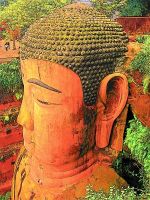In 1986, workers digging for a brick company near Guanghan City in Sichuan Province unearthed a treasure trove of artifacts that became “the most important archaeological discovery of China in the 20th Century.”
Many Westerners would say the Terracotta Army of Xi’an was China’s most significant archaeological find of the past 50 years. It was discovered in 1977 and dates to 210 BC.
Hard to argue, yet the Sanxingdui ruins, which are between 3,000 to 5,000 years old, was described by the major media as the “most important” and “most attractive archaeological discovery in the world.”
Archeologists excavated two large burial pits that yielded more than 3,000 gold, bronze and jade artifacts of surprisingly high-quality workmanship.
It was reported that the discovery of the pits pushed back the perceived date of the Bronze Age in China by as many as 1,000 years.
Among the items found were tools and practical instruments, weapons and daggers, artifacts of religious worship, and a series of bronze masks, some with gold coverings.
A guide at the Sanxingdui Museum, located about two hours from Chengdu, said an unnamed city existed at the site 5,000 years ago but disappeared 2,800 years ago for some unknown reason.
It is said that this was the capital city of the ancient Shu Kingdom and these are the largest ruins from that period to ever have been uncovered.
What’s incredible is visiting the museum and looking at artifacts that are 5,000 years old; particularly because so many of the items are in incredibly great shape.
For those into history and archeology, the Sanxingdui Museum is a must-see for the China Traveler.
- Next week: An irrigation ditch that attracts tourists like Disneyland.
- Still to come: A fire-breathing opera star.






